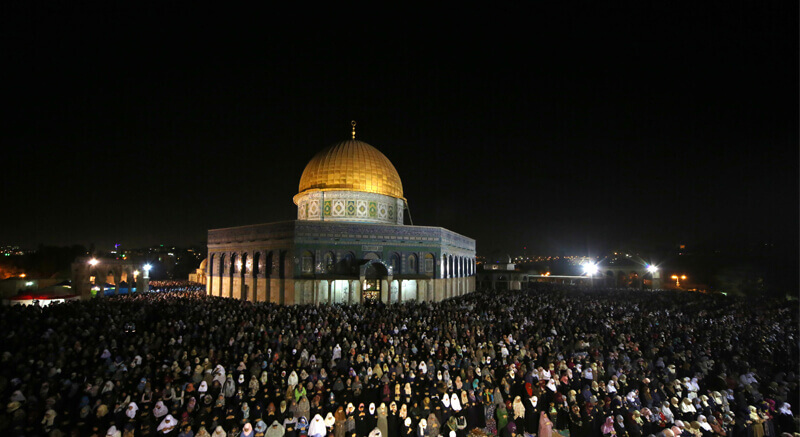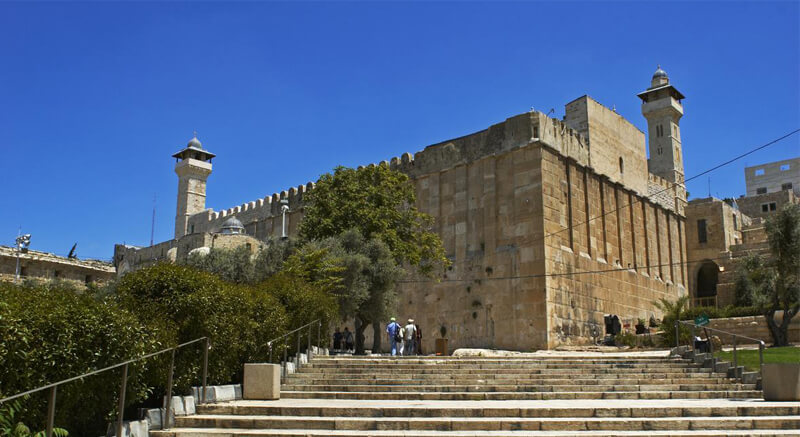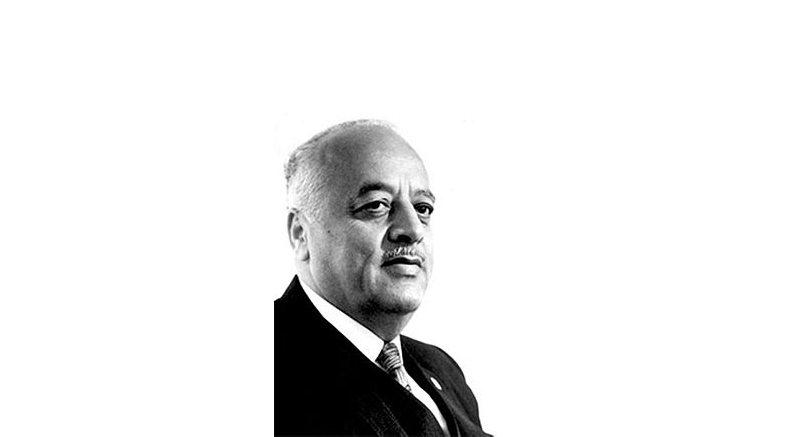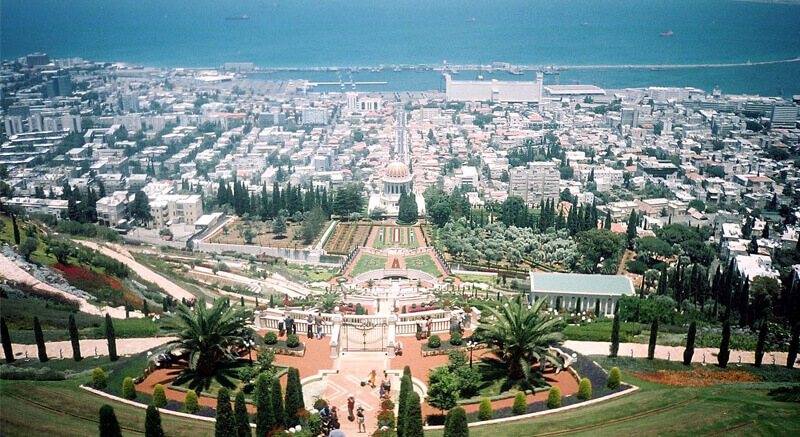Article 5
Members of the PNC shall be elected by the Palestinian people, through direct ballot according to a system drawn up by the Executive Committee.
Article 6
- If the elections to the PNC can not be accomplished, the PNC will continue to act until circumstances allow.
- If, for any reason, a seat or more in the PNC is vacant, the PNC nominates the member or members to occupy the vacant seats.
Article 7
- The Palestine National Council is the supreme authority of the PLO, which draws up its policies, plans and programmes.
- Jerusalem is the seat of the PNC.
Article 8
The term of office of the PNC is three years. It convenes annually on convocation by the Speaker. The Speaker can call the PNC into an extraordinary session upon the request of the Executive Committee or one quarter of the Council's members. The site of the convention shall be in Jerusalem, Gaza, or any other place, depending on the circumstances. If the Speaker does not call for such a meeting, the PNC is considered, automatically into session, at the time, and place requested by its members or by the Executive Committee.
Article 9
The Presidential Bureau of the PNC is composed of: the Speaker, the two Deputy speakers and the Secretary General, elected at the beginning of the session.
Article 10
The National Council considers in its ordinary session the following:
- The annual report submitted by the Executive Committee on the performance of the PLO and its organs;
- The annual report of the National Fund and the approval of the budget;
- The suggestions forwarded by the Executive Committee and the recommendations of the Council committees;
- Any other issues presented to it.
Article 11
According to Article (11) of the Statute of Palestine Liberation Organization (PLO), the Palestinian National Council - to facilitate its work - forms the standing committees that PNC deems necessary to form. After the twenty-third session of the PNC on 30 April – 3 May 2018, the committees are now as follows:
- Economic and Financial Committee
- Committee of Foreign Parliamentary Affairs
- Committee of Women and Childhood Affairs
- The Popular Resistance Committee
- People's Organizing Committee
- Al-Quds Committee
- Media and Thought Committee
- Legal Committee
- Health Affairs Committee
- Monitoring, Accountability and Fact-Finding Committee
- Political Committee: Chairman
- Refugee Affairs and Right of Return Committee
- Education, Science and Culture Committee
Article 12
Two-thirds of its members form the quorum and decisions, are taken by the simple majority.
The Internal List of Rules of the Palestine National Council
Division One – Council Bureau
Chapter One – Age Office
Rule 1
Upon the opening of the first sitting of the first session, of every National Council, the most senior member present shall occupy the Chairmanship chair. Additionally the secretarial work shall be carried out by the most junior member present. From both of them, the Interim Bureau shall be composed. Their task shall come to an end upon the election of the member of the Permanent Bureau, as stipulated in the Statute.
Rule 2
No discussion shall be allowed before the election of the Speaker.
Chapter Two – Presidential Bureau
Rule 3
The Council Presidential Bureau shall be composed of the Speaker, the two Deputy Speakers and the Secretary – General.
Rule 4
Candidature for the membership of the Bureau shall be confidential and anonymous.
Rule 5
Candidature for the membership of the Bureau shall be forwarded to the Chairman of seniority. In all cases, the election process for the presidency, shall be performed even if only the required numbers are proceeding for the candidature;however the election of the Deputy Speakers and the Secretary General shall be without vote in case only the required numbers are proceeding fot the candidature.
Rule 6
Members of the Bureau shall be elected by an absolute majority of the members present.
Rule 7
If no candidate for presidency receives absolute majority, the election shall be repeated between the two members with the most votes. If one or more members receive equal votes, with one or both of them, they shall join them on the second round. In this case, relative majority shall be enough. If two members or more receives equal votes, the priority shall be determined by lot.
Rule 8
At the beginning of the election process, every member shall be given a ballot paper, in which, the name of the candidate for the PNC Bureau, is written and placed in the designated ballot box.
Rule 9
The Administrative Secretary and under the supervision of the Speaker, shall collect the ballot papers and the results. The Speaker, then, declares and announces the results of the election.
Rile 10
Members of the Executive Committee, shall not be entitled to combine their positions and the membership of the Council Bureau.
Chapter 3 – Responsibilities of the Bureau
Rule 11
The Council Bureau shall supervise the works and discussions of the Council according to the List of Rules. It shall also draw up the procedure for editing the minutes of the sittings and the system to be followed by the committee’s secretariat.
Rule 12
A special office for the Presidential Bureau is prepared in the official Headquarters of the PLO, and a full-time administrative secretary, appointed by the Council Bureau shall run its affairs.
Rule 13
The Bureau shall convene on convocation by the Speaker and its meetings shall be confidential. The Administrative Secretary shall be the only person who can attend its meetings, in addition to its members. Its sittings will be valid if the majority of its members attend. Resolutions shall be passed by absolute majority. If the votes are equal, the casting vote shall be to the Speaker.
Rule 14
The Council Speaker shall be the Spokesman for the Council expressing its will, observing the implementation of its Statute and its Internal List, preserving its discipline, opening its sittings, announcing their closure, controlling its works, running its discussions, giving permission to take the floor, defining topics of discussions, directing the attention of the speakers to the need for limiting their statements to the topic under discussion, clarifying or asking for clarification to a point he/ she thinks is unclear, directing questions, announcing the decisions issued by the council, observing the work of the secretary and supervising, the general efficient running of all works of the Council.
Rule 15
The Deputy Speaker shall preside at the sitting, in case the Speaker is not present. If the senior Deputy Speaker is also not present, the junior Deputy Speaker will take the chair. The senior member present shall chair the sitting, if the latter is also absent.
Rule 16
The Secretary – General shall observe the editing of the minutes of the sittings, receive the members' proposals, register the names of the members, arrange requests to take the floor in the order he receives, collect the votes and record them, observe the results of the voting, carry out any disciplinary procedures. In general, he or she shall carry out all the tasks entrusted to him / her by the Speaker.
Division Two – Sittings
Chapter One – Convention of Sittings
Rule 17
Council sitting shall be confidential .Only the Council’s members shall be entitled to attend them, unless the Council decides otherwise.
Rule 18
The Council shall convene annually, on convocation by its Speaker or in extraordinary sessions as per a request from the Executive Committee or one fourth of its members. If the Speaker does not call for such a meeting, the Council shall be automatically into session at the site and time fixed in the members' request, or the request of the Executive Committee.
Rule 19
The Council shall not be entitled to convene,unless it has two-third quorum.
Rule 20
Decisions shall be taken by the majority votes of the members present, unless, in some special cases, where it is stipulated otherwise.
Rule 21
The Speaker, shall prepare the agenda and the members shall be notified of it, at least a week prior to the convention of the meetng.
Rule 22
The Speaker through the Council shall consent to the announcement of the closure of the session.
Rule 23
It is inadmissible to discuss a topic not listed in the agenda, unless on the request of the Executive Committee,or the Speaker and follows the approval of the Council ,or a written request submitted by at least twenty members and having the approval of the Council. The Council shall resolve the matter after giving the floor to one supporter and to one opposer for a maximum period of 5 minutes.
Chapter Two – Minutes of sittings
Rule 24
A record of the procedures, topics, discussions and decisions at the sitting shall be edited.
Rule 25
Being printed, the minutes of the meeting shall be circulated to the members and submitted to the Council, on the first coming sitting for ratification. Every member present at the sitting shall have the right to propose any amendments,as he/she sees. If the Council approves the amendments, it shall be registered in the record of the sitting and the minutes of the previous sitting, should then be corrected. No correction shall be allowed in the minutes of the session, unless approving them. The ratification of the Speaker on the minutes of the last sitting of a session shall be sufficient, even if not ratified by the Council.
Rule 26
Being ratified, the minutes of the sitting shall be signed by the Speaker, his/ her Deputy and the Secretary – General.
Chapter Three – Order of speech
Rule 27
No member shall be allowed to speak at the sitting, without requesting that and given the permission by the Speaker. The Speaker shall not be entitled to reject giving permission to any member requesting to take the floor, unless the rejection is in conformity with the Rules of the List. If contravention on that occures, the Council's view shall be sought and a decision shall be issued by the Council without debate.
Rule 28
The Secretary – General shall register the requests for taking the floor, in the order he/she receives. No request for speech shall be accepted on a topic relegated to a committee, before the presentation of its report.
Rule 29
No members shall be entitled to take the floor, more than twice on the same topic; one during the general debate and the other during discussing the proposals on bills presented on the same topic.
Rule 30
The Speaker shall fix a deadline for the requests to discuss for the general debate, proposals and the bills presented.
Rule 31
Permission to take the floor in the following cases shall always be given:
- Drawing attention to the need of observing the Articles of the Statute and the Rules of the Internal List;
- Requests for postponing;
- Correcting a claimed event;
- Reply to words not in favour of the member requesting that right;
- Defending the need to carry out a debate on an issue;
- Postponing considering the subject into discussion until resolving another subject;
All these requests shall have priority over the original subject and entails retraining from discussions related to it, until the Council takes decisions on them. Nevertheless, no permission for taking the floor shall be given in these cases till the Speaker finishes his word. The interruption shall only be for drawing the attention of the Speaker to the Articles of the Statute and the Rules of the Internal List or for correcting a claimed event.
Rule 32
Those taking the floor shall be prohibited from uttering any offensive expressions or words affecting the reputation of individuals, institutions, public interest or committing any act having a restive effect on disciplinary procedures.
Rule 33
The Speaker shall be entitled to call members taking the floor by name to ask him\her to observe the regulations or even prohibit him\her from speaking if the former contravenes (Rule 32).
In case the member shows objection to the Speaker, the Speaker shall refer to the Council for an opinion. The Council’s decision shall be issued without debate.
Division Three – Committees
Chapter One – Committees Formation
Rule 34
To facilitate its works, the Council shall form the following committees.
- Military Committee;
- People's Organization Committee;
- Financial Committee;
- Executive Committee Report Study Committee;
- Judiciary Committee;
- Information Affairs Committee;
- Cultural and Arts Committee;
The Council shall be authorized to form ad hoc committees, cancel
some committees, or incorporate the work of two committees or more, into one committee.
Rule 35
Each Committee shall be composed of not less than ten members chosen by the Council.
Rule 36
Choice of the committees' members shall be conducted at the first Council's sessions. Any member shall be entitled to proceed for the election of the committee he\she prefers. The Council Bureau shall receive these requests and coordinate them, in consultation and agreement with the presenters. The Speaker then, shall present the final formations of the Council to the Council for approval.
Rule 37
No member shall be allowed to join more than one committee unless the Council passes a special decision consenting to this.
Rule 38
It is inadmissible to combine the membership of the Executive Committee and the Council committees.
Rule 39
Each committee shall elect a president and a rapporteur from amongst its members. If both, or one of them is absent, the committee shall elect from its members, one who shall occupy the vacant position temporarily.
Rule 40
Each committee’s president shall run its work.
Rule 41
Committees shall convene on convocation by its president or the speaker by the request and the presence of the majority of its members.
Rule 42
Committees sitting shall be confidential, and their validity is only ensured by the presence of the majority of their members. The decisions shall be issued by an absolute majority.
Rule 43
A record of every committee sitting containing the names of the present and absent members, summaries of the discussions, and the texts of the decisions, shall be edited and signed by the president of the committee and its rapporteur.
Rule 44
The Speaker shall relegate to the committees, all papers relating to the issues transferred to them.
Rule 45
Committees shall have the authority to ask through the Council Speaker, for any information or clarification with regards to the subjects submitted to any member of the Executive Committee.
Rule 46
The Executive Committee’s members shall be entitled to attend the committees' sittings and the committees shall be able, through the Council Speaker, to ask for the attendance of the relevant Executive Committee member at their sittings.
Rule 47
Each Council member shall be entitled to attend the sittings of the committee in which he/she is not a member to hear the discussions, on condition that he/she, shall not interfere in the discussions or make any remarks.
Rule 48
Each committee shall have to report every subject relegated by the Council during the fixed period.
Rule 49
The report shall be submitted to the Council Speaker to be listed in the agenda and the reports shall have to be printed and circulated to the members, at least 24 hours prior to the sitting allotted to consider them.
Rule 50
The report shall have to contain the committees' points of view on the subject relegated to them and the texts of the bills or proposals shall be attached.
Rule 51
The president of the committee shall explain the view of the committee to the Council. In case he\she is absent, the Council Speaker shall ask the rapporteur of the committee’s members present to choose a member, to explain the report on behalf of the president.
Rule 52
Ten members or more shall be able to present, in writing a bill or a proposal on the topic under discussion. The Speaker shall put it for discussion after the conclusion of the general debate, on the same subject.
Division Four – Statute amendment
Rule 53
In case the Council members request an amendment for the Statute, as per Article 29 of the Statute, the Speaker shall notify the Council of that, on the first sitting, in order to be relegated to the relevant committee. Its discussions shall have to be limited on the principle of amendment. The request shall be in writing, including articles and attached by an explanatory memorandum, signed by at least one-fourth of the Council members.
Rule 54
The report of the committee shall be submitted to the Council. No discussions of the report shall be allowed, before at least two days from its circulation to the members. To approve the principle of amendment, the Council’s decision should be issued by the majority. The Council shall not be entitled to discuss the articles intended to be amended, until after two days from the Council approval to the principle of amendment.
Rule 55
Discussion of these articles shall take place at two sittings. The second deliberation shall take place two days (at least) after the first one. After concluding the second deliberation, the position of the members towards the proposed amendment shall be announced, then by roll call. The amendment shall be valid if it gets two-third majority.
Division Five – General budget
Rule 56
The Council Speaker shall relegate the general budget to the Financial Committee for their opinion.
Rule 57
The president of each committee shall participate in the meetings of the Financial Affairs Committee, to express his views towards the budget of the section his committee is interested in.
Rule 58
The Committee shall submit a general report on the draft budget bill, including its views on the allocations of the date fixed to it by Council.
Rule 59
The budget shall be approved, through a system agreed upon by the Council.
Division Six – Closure of debate
Rule 60
The Speaker shall declare the closure of the debate, after the members requesting to take the floor finish their words.
Rule 61
The Speaker shall be entitled to suggest the closure of the debate, if he\she thinks that a topic has been fully discussed. Twenty members signing a written request shall also be entitled to suggest the same. The Council then shall decide that accordingly.
Rule 62
It is inadmissible to suggest the closure of a debate, unless three supporters and three opposers have spoken on the concerned topic.
Rule 63
No permission shall be given to suggestions on the closure of a debate, except for one of the opposers and one of the supporters. The time allowed shall not exceed five minuets. Priority shall be for those requesting to talk about the original subject. The Council shall issue its resolution.
Rule 64
Requests for speaking shall not be allowed after the closure of the debate and before taking the views, unless for identifying the form of the question seeking opinions.
Division Seven – Taking views
Rule 65
No question seeking an opinion shall be forwarded, unless by the Speaker.
Rule 66
If the matter submitted including several issues and , it is requested to discuss them separately; the views shall be taken on each point separately.
Rule 67
Before taking opinions, the validity of the required number should be ensured.
Rule 68
Every member shall have to express an opinion on every subject entailing an opinion. Abstention from giving opinion shall not be acceptable, but for reasons given, after taking opinions and before declaring the result.
Rule 69
The voices of those abstaining from giving their opinions, either from the supporters or the opposers, shall not be counted.
Rule 70
Opinions shall be taken by raising hands, except for the following cases they shall be taken by roll call:
- Cases demanding special majority;
- Written request presented by at least twenty members before starting taking the opinions. To agree on that request, the presence of the members submitting the request at the sitting, should be checked;
Rule 71
The Speaker shall announce the Council’s decision, in conformity with the result of the opinions.
Rule 72
Return to a debate on a subject the opinions have already been taken on, shall not be admissible.
Division eight – Depriving from membership
Rule 73
The Council shall consider depriving a member from membership in the following cases:
- If the member does not attend three successive sittings, without the Council’s permission or an acceptable excuse;
- If he\ she works with a government or an institution or a non-Arabic foreign state, which arouses suspicion regarding his \ her national loyalty;
- If he\she commits an act contravening with the Statute of the PLO.
Rule 74
The proposal for depriving a member from the Council’s membership shall be submitted to the Speaker, in writing and shall be signed by at least one-fifth of the Council members. The Speaker shall have to notify the concerned member of that and present the proposal to the Council at its first session.
Rule 75
The Council shall relegate the proposal of depriving from the membership to a committee to discuss it. The committee shall submit its report during two days at most.
Rule 76
The Council shall discuss the committee report at one sitting. The member concerned shall be entitled to attend the sitting and participate in the discussions, to leave the sitting at the beginning of the process of taking voices.
Rule 77
Opinions for depriving a member from membership shall be taken by roll call and the decision passed if two-third majority of the voices is received.
Rule 78
Passing away of a member shall end his membership. Resignation also shall end membership if the Council approves it by an absolute majority.
Rule 79
The vacant post resulted by ending the membership shall be occupied by the same way it was occupied previously.
Rule 80
The rules of this list shall cover the plenary sittings, as well as the committees' sittings.
Rule 81
Amending the rules of this list, shall entail a written request signed by at least one-fifth of the Council’s members and approved by two-third majority.
Rule 82
This list of Rules shall be carried out once approved by the National Council.
Text of The Decision Considering The Elected Members of the Palestinian National Council
Members In The Palestine National Council
Paragraph A –Article 3 of the Palestinian Electoral Law states.”In conformity with Articles 5 and 6 of the Statutes of the PLO the elected members of the Palestinian Legislative Council considered PNC members.
According to the same Palestinian Electoral Law, the Palestinian Legislative Council will have to carry out two functions.
- Enacting the laws, organizing the nature and work in the National Authority in the transitional period.
- Monitoring and judging the work of the Executive Authority.












